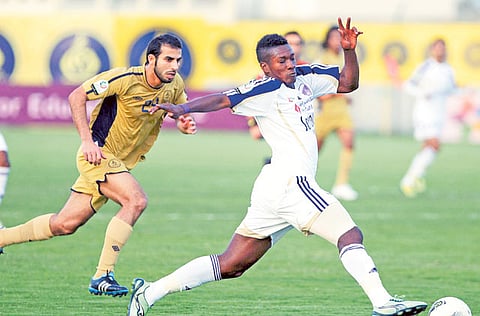Why no star signings?
AFC licensing and big-name flops prompt rethink

Dubai: New financial rules and the failure of ‘big-name’ signings have forced UAE clubs to become more conservative in their summer spending, according to league analysts.
As of this season, the Asian Football Confederation (AFC) is introducing mandatory club licensing for the UAE’s top-four teams, which will spread to the other ten clubs the season after next.
Clubs will have to ensure they meet regulations regarding financial transparency and commercial viability.
If they fail to adhere to the new conditions, they could forfeit their places in local and continental top-flight football.
One of the financial criteria to obtain a licence is that clubs must ensure there are no overdue payments from player transfers or coaching dismissals.
Meanwhile, commercial criteria require clubs to generate their own income rather than rely on independent benefactors.
Football agent Mohammad Najm Abed, of Hattrick Sports Services, Dubai, are partly the reason for the lack of star signings by UAE clubs this summer.
He said: “It looks like clubs are being more organised and careful this summer. There aren’t big names like Luca Toni, David Trezeguet or Asamoah Gyan coming into the market like there was last year. We’re offering big names, but no one wants them. Clubs are looking for younger, fresher alternatives.”
Fellow agent, Romeu Castro, suggested the trend was also down to clubs becoming wiser to the false promises of so-called ‘big names’.
“Clubs have learnt an important lesson this season,” said Castro, “the difference between a marketing tool, and a tool that actually gets you success on the field.”
Castro, who cited Al Shabab’s snubbing of Michael Owen as a prime example of clubs turning their backs on star names, added: “After the disasters of Fabio Cannavaro at Al Ahli and David Trezeguet at Bani Yas, clubs are starting to give younger, less well-known players a chance, with the view to making a profit upon their potential resale. They now need to make money instead of wasting it.”
Didier Drogba’s summer move to China and Clarence Seedorf’s switch to Brazil also show a shift in wider market forces according to Castro, where the Middle East and North America once dominated in attracting ageing stars.
Now, like in Europe, Castro suggested the Middle East was enduring a quieter period, with only Raul’s move to Qatar making big headlines.
Khalid Awad, assistant CEO of Al Wahda, agreed. He said: “Big names have enriched our league from a media and marketing perspective, but they haven’t improved the football. We want younger players with potential, who will use the UAE as a pathway into Europe.”
Awad said clubs were also looking for younger, fitter players because of the league’s expansion to 14 teams, resulting in an increased 26-match schedule. He also suggested that clubs were still spending this summer, but just in areas other than the transfer market, in order to satisfy other licensing criteria like infrastructure and staff development.
Meanwhile, Al Ain CEO, Carlo Nohra, said he hadn’t noticed a difference in year-on-year transfer activity.
“There’s nothing in the AFC licensing scheme which enforces restriction on expenditure. It’s more about how you account for expenditure. I don’t think AFC licensing has anything to do with the relative quiet in the market. It’s just that there’s no particular rush to sign players.
He added: “Al Ain’s emphasis is on spending wisely to bring continued success to the club over several years, not to bring in players in the twilight of their career to play one season and leave. We’re looking for longer-term investment.”


